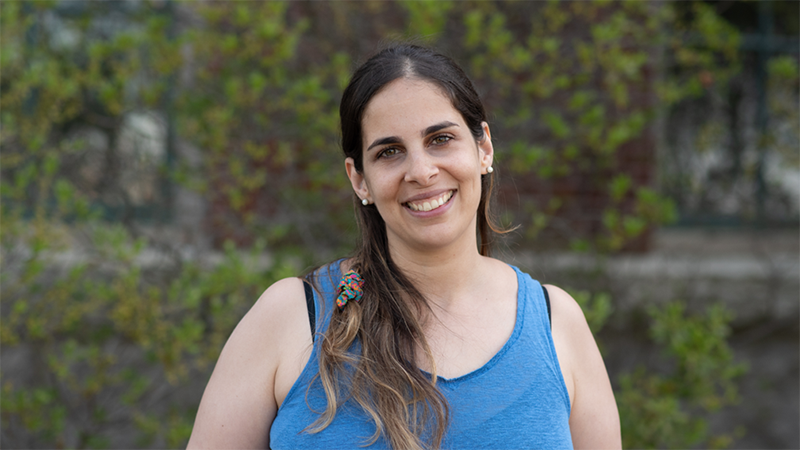I study mechanisms by which neurons die in neurodegenerative disorders. In particular I’m interested in diseases where there are aberrant accumulations of a DNA and RNA-binding protein called TDP-43 protein – which include Amyotrophic Lateral Sclerosis, Frontotemporal Dementia, and Alzheimer’s Disease. In normal conditions TDP-43 is mostly present in the nuclei, but in these disorders it leaves the nuclei and so its function is disturbed. The recent discovery of a key target of this protein by our lab and others, Stathmin-2, has opened up the possibility of new biomarkers and therapeutics for these disorders.
Photo by Celia Muto
What drew you to this area of neuroscience?
As soon as I knew I wanted to be a researcher, I knew I wanted to study the brain. I was always curious about the molecular mechanisms of the brain. I mastered in neuroscience and then I specialized in neurobiology and mechanisms of synaptic transmission for my PhD. After that, I wanted to apply my knowledge of neuron biology to disease research. So I moved here to Boston to work with Clotilde Lagier-Tourenne, an expert in the field of neurodegeneration. Lagier-Tourenne has multiple collaborations with other academic experts and industry groups and works very closely with other clinicians. This allows me to do very interesting and meaningful research.
What is the first experiment you remember doing?
While I was doing my undergrad degree in biochemistry, I received a scholarship from the Portuguese government to work in a lab. I went to an organic chemistry lab to optimize compounds to be more penetrable in the nervous system. I was fascinated by the concept and still vividly remember the excitement of those experiments. However, I realized that the work, though interesting, was too removed from direct biological applications for me. Motivated by this experience, I changed my focus and pursued internships in neuroscience labs, where I could work closer to cellular processes.
What has been the most surprising thing you’ve learned in the lab or classroom so far?
After my first year at a university, I was afraid that research work would be very solitary. I am an extrovert, and really like to work with other people. The thought of working alone made me very afraid, and I almost changed my degree. The most surprising thing I learned is how much teamwork there is in science. In all the labs I have worked, I always find amazing people to discuss my ideas with, and my work is much better for it. I have worked with wonderful mentors who have had a tremendous impact on my career development. Being involved in many collaborations has highlighted for me the remarkable effect that collective effort can have on the quality and impact of research.
What are your hopes for the future?
My dream job is to have my own lab where we study the mechanisms of neurodegenerative disorders in Portugal, my home country. Portugal is full of great researchers, and university faculty who are really dedicated to their students. I hope I can make the transition to work in Portugal, and keep the collaborations with all the amazing researchers I have met abroad.

